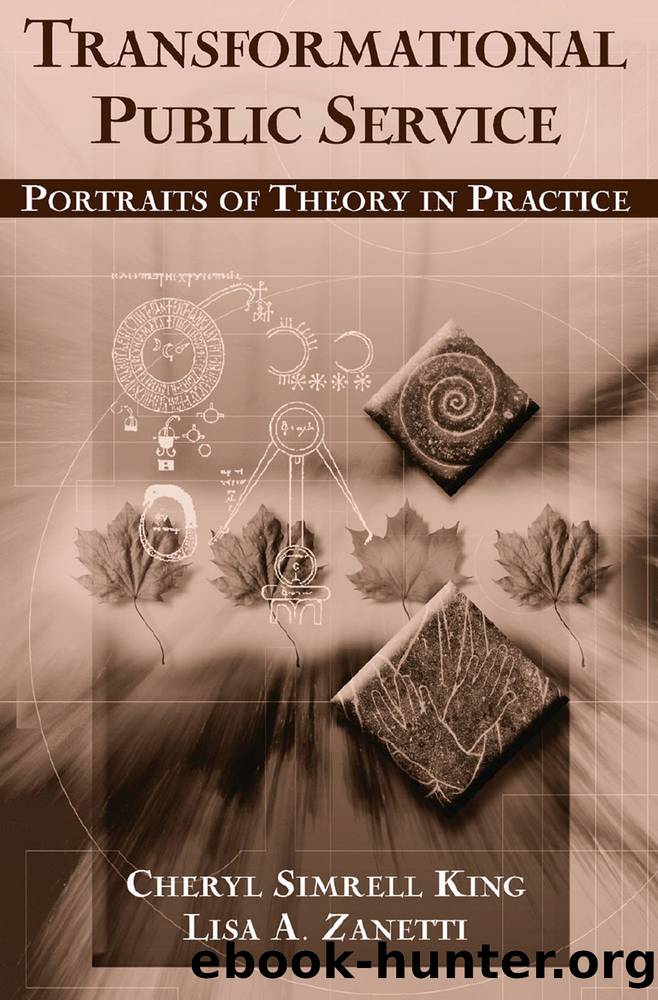Transformational Public Service by King Cheryl;Zanetti Lisa; & Lisa A. Zanetti

Author:King, Cheryl;Zanetti, Lisa; & Lisa A. Zanetti [King, Cheryl Simrell & Zanetti, Lisa A.]
Language: eng
Format: epub
Publisher: Taylor & Francis Group
Published: 2005-08-15T00:00:00+00:00
Part III
Transforming Institutions
Story:
Transforming Bureaucracy
Douglas MacDonald
Department of Transportation, State of Washington
DOI: 10.4324/9781315698618-7
When Cheryl first met Doug, he had been the secretary of the Washington State Department of Transportation (WSDOT) for only a short time. He was already making waves, working to transform a bureaucracy steeped in an âengineering mentalityâ into an active, citizen-centered agency. Transportation in Washington state is a place where the rubber meets the road with regard to citizen disconnection and discontent. For most Washington citizens, nary a day goes by when they do not encounter a transportation issue, whether it is funding, gridlock (on the I-5 corridor, specifically), or maintaining rural roads. Washington state citizens, like those in other states, encounter government in the form of transportation policies and problems on a daily basis. As a result, WSDOT is a place where citizen attitudes are formed and shaped.
As secretary, one of the first things Doug did was to move his administrative office from the top floor of the WSDOT building on the State Capital Campus to the first floor, signifying his availability to the public. In addition, he began to appear everywhere, in an orange WSDOT safety vest and his hard hat. At a major accident on I-90, Doug was the spokesperson for the media, not the departmentâs public information officer. After a maintenance-related incident that resulted in unanticipated gridlock, Doug appeared on a Seattle radio talk show and admitted that WSDOT had made a mistake.
Doug came to this position after a successful run as the executive director of the Massachusetts Water Resources Authority (MWRA). Under his guidance, the MWRA transformed the management of the water supply and waste treatment systems for greater Boston. The key reasons for the success of this project, according to Doug, is that the project had a strong goal consensus; the broadest possible ownership of the project was encouraged; the work was grounded in management commitments linked to the values of transparency, collaboration, and respect and a commitment to quality and integrity; the project benefited from the delivery of a constant succession of benefits; and the project was blessed with good timing and good luck. Doug brought all of these tendencies with him to his work with WSDOT.
Doug considers himself not so much a product of his Harvard education as a product of the Peace Corps.
My university education is in the Peace Corps. That is my alma mater. I went into the Peace Corps being well suited to do what the Peace Corps did because I had a lot of interesting experiences in college that prepared me to do that sort of thing. But, I donât feel like I am a graduate of Harvard College and Harvard Law School. I feel I happened to go to those places to get educated, but that, in fact, the Peace Corps is where my class is, where my group is. When I went to the Peace Corpsâ twenty-fifth anniversary a few years ago, I felt it was the one place where the group with whom I
Download
This site does not store any files on its server. We only index and link to content provided by other sites. Please contact the content providers to delete copyright contents if any and email us, we'll remove relevant links or contents immediately.
| Direct | Global |
| Industrial | Multilevel |
| Product Management | Research |
| Telemarketing | Web Marketing |
Influence: The Psychology of Persuasion by Robert B. Cialdini(4601)
The Miracle Morning by Hal Elrod(4422)
The Hacking of the American Mind by Robert H. Lustig(4086)
Pre-Suasion: A Revolutionary Way to Influence and Persuade by Robert Cialdini(3977)
Unlabel: Selling You Without Selling Out by Marc Ecko(3471)
Ogilvy on Advertising by David Ogilvy(3329)
Hidden Persuasion: 33 psychological influence techniques in advertising by Marc Andrews & Matthijs van Leeuwen & Rick van Baaren(3292)
Purple Cow by Seth Godin(3069)
Who Can You Trust? by Rachel Botsman(3025)
Kick Ass in College: Highest Rated "How to Study in College" Book | 77 Ninja Study Skills Tips and Career Strategies | Motivational for College Students: A Guerrilla Guide to College Success by Fox Gunnar(2998)
This Is Marketing by Seth Godin(2905)
I Live in the Future & Here's How It Works by Nick Bilton(2844)
The Marketing Plan Handbook: Develop Big-Picture Marketing Plans for Pennies on the Dollar by Robert W. Bly(2796)
The Power of Broke by Daymond John(2775)
Building a StoryBrand by Donald Miller(2754)
The 46 Rules of Genius: An Innovator's Guide to Creativity (Voices That Matter) by Marty Neumeier(2678)
Draw to Win: A Crash Course on How to Lead, Sell, and Innovate With Your Visual Mind by Dan Roam(2639)
The Tipping Point by Malcolm Gladwell(2559)
Market Wizards by Jack D. Schwager(2540)
